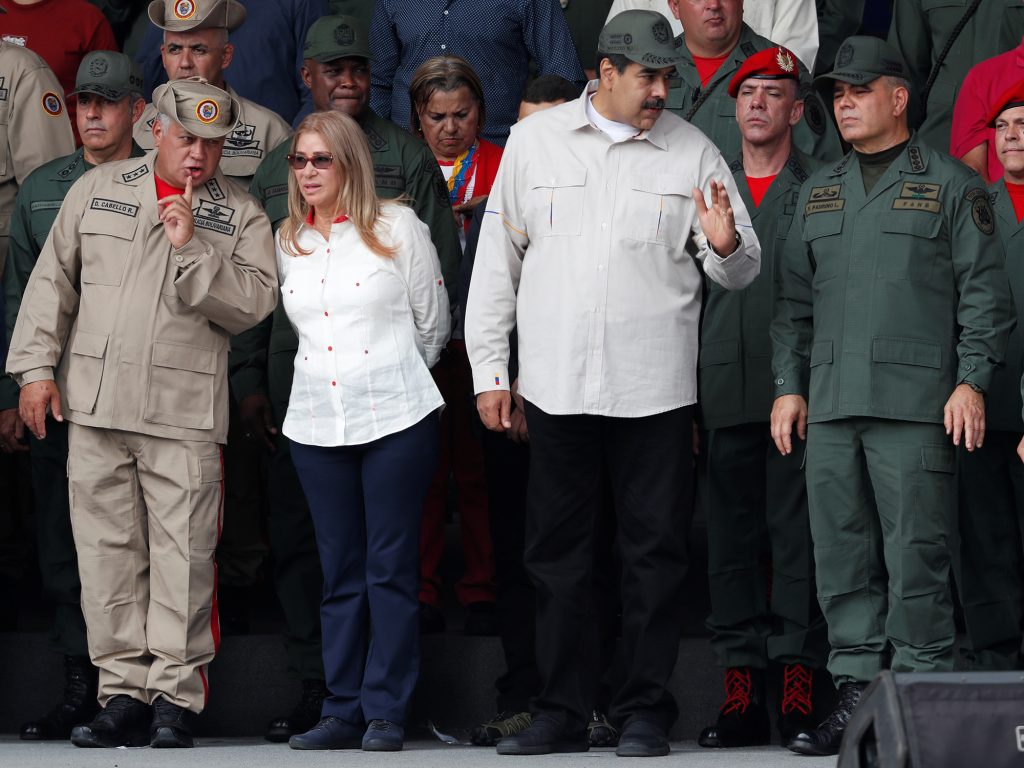On August 13, 2020, the Atlantic Council’s Adrienne Arsht Latin America Center hosted a virtual conversation to discuss how a global network of illicit activities is propping up the Nicolás Maduro regime, and how the United States and the international community can take new action to confront this expanding criminal network. The event marked the launch of the Center’s latest publication, “The Maduro Regime’s Illicit Activities: A Threat to Democracy in Venezuela and Security in Latin America,” authored by Douglas Farah, president of IBI Consultants and Atlantic Council author. The publication and the event are part of the Center’s latest programming seeking to inform new policy actions from the international community to more effectively tackle the Maduro regime’s criminal activities and its support from malign regional and global actors that impede a restoration of democracy in Venezuela.
Admiral Craig Faller, commander of the US Sothern Command (SOUTHCOM), joined Center Director Jason Marczak for a keynote conversation on the role of SOUTHCOM in tackling illicit flows originating from the Maduro regime, and the threats they represent for the entire hemisphere. Admiral Faller then joined a panel discussion with Denise Natali, assistant secretary in the Bureau of Conflict and Stabilization Operations at the US State Department; Carrie Filipetti, deputy assistant secretary in the Bureau of Western Hemisphere Affairs at the US State Department; and Douglas Farah. Diego Area, the Center’s associate director for Venezuela, moderated the panel discussion.
When asked about major security challenges coming out of Venezuela, Admiral Faller stated that the Maduro regime’s illicit activities erode democratic institutions and citizen security in Venezuela and across the region. At the heart of the threat, the region is vulnerable to “unnecessary loss of life and undermining democratic practices, all exacerbated by the COVID-19 pandemic,” said Admiral Faller. He emphasized the importance of the United States working alongside its regional and international allies in curtailing the range of criminal activities stemming from Venezuela – such as narcotrafficking, weapons trafficking, illicit gold mining, and money laundering – as well as the critical support the regime receives from malign actors such as Russia, Cuba, Iran, and China.
In the panel discussion, speakers discussed the threat of irregular armed groups to stabilization in Venezuela, US policy toward the Maduro regime, and the role of the international community, especially that of Europe, in placing additional international pressure on the regime’s criminal network. Assistant Secretary Natali expressed that the United States, in coordination with its allies, is focusing on the threat of non-state actors such as dissidents of the Revolutionary Armed Forces of Colombia (FARC) and the National Liberation Army (ELN) as part of an interagency effort on security sector planning for Venezuela. The United States is “conducting advanced data analytics to understand the operating environment and improve stabilization plans,” she added.
Deputy Filipetti highlighted that not only irregular groups, but also nefarious state actors – such as Russia and Cuba – play a pivotal role in helping to keep the Maduro regime entrenched. To this point, Farah emphasized the Maduro regime’s long-standing support and dependence on “a consortium of states that now recognize illicit activities as a legitimate instrument of state funding, looking to displace the United States as much as possible in the region.” Deputy Filipetti noted, however, that over the last few years, Venezuela has grown increasingly dependent on Iran, a signal that Maduro is seeking to expand its support beyond its traditional allies.
Speakers agreed on the urgency of a comprehensive international approach to confront the regime’s illicit networks. Admiral Faller reaffirmed the importance of continued US cooperation with regional allies, as exemplified in partnerships with Colombia and countries in Central America and the Caribbean. Beyond the region, Deputy Filipetti added that “our European partners [need] to step up to the plate to increase the number of sanctions, to make sure they are protecting assets for the Venezuelan people, and to not fall for the tricks that the Maduro regime tries to play.”
As Venezuela grapples with its complex economic and political reality, the speakers agreed that cutting the regime’s criminal domestic and international support is imperative to further the prospects of a democratic restoration. In his closing words, Marczak emphasized “the persistent need for coordinated action against the Maduro regime and ongoing support for democracy in Venezuela.”
Cecilia Godoy is an intern at the Atlantic Council’s Adrienne Arsht Latin America Center.
Image: Venezuela's President Nicolas Maduro talks to Venezuela's Defense Minister Vladimir Padrino Lopez and Remigio Ceballos Strategic Operational Commander of the Bolivarian National Armed Forces, as Venezuela's National Constituent Assembly President Diosdado Cabello talks to Cilia Flores, wife of Venezuela's President Nicolas Maduro, during a ceremony to mark the 17th anniversary of the return to power of Venezuela's late President Hugo Chavez after a coup attempt and the National Militia Day in Caracas, Venezuela April 13, 2019. REUTERS/Carlos Garcia Rawlins
